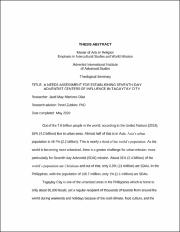| dc.description.abstract | Out of the 7.6 billion people in the world, according to the United Nations (2018), 55% (4.2 billion) live in urban areas. Almost half of that is in Asia. Asia’s urban population is 49.7% (2.2 billion). This is nearly a third of the world’s population. As the world is becoming more urbanized, there is a greater challenge for urban mission, more particularly for Seventh-day Adventist (SDA) mission. About 31% (2.4 billion) of the world’s population are Christians and out of that, only 0.9% (21 million) are SDAs. In the Philippines, with the population of 106.7 million, only 1% (1.1 million) are SDAs.
Tagaytay City is one of the urbanized areas in the Philippines which is home to only about 80,000 locals, yet a regular recipient of thousands of tourists from around the world during weekends and holidays because of the cool climate, food culture, and the
scenery of Taal lake. Although Christianity is the major religion of the people in Tagaytay City, the SDAs are only 0.1% of the city’s population while 95% are Roman Catholics and the rest are Iglesia ni Cristo and others (Tagaytay City Ecological Profile, 2019, p. 22). The Cavite Adventist Mission (CDM), desiring to reach out to the people of Tagaytay City and aid the SDA Church growth, intends to establish centers of influence that will meet the needs of the people and will open opportunities of introducing Jesus to them and lead them to follow Him. Before the establishment of centers of influence, a needs assessment which has never been done before in Tagaytay City must be done.
This study used mixed methods of gathering quantitative and qualitative data with a non-probability cluster sampling approach to know the needs of the people in Tagaytay City. For the quantitative data, a needs assessment survey questionnaire in establishing SDA centers of influence in Tagaytay City was used to survey 95 study samples from 3 selected urban barangays of Tagaytay City, namely: Kaybagal South, Silang Crossing East, and San Jose. The survey questionnaire includes demographic questions and questions on 4 areas of needs such as health, education, finance/employment, and emotional and spiritual well-being. There are 3 questions per area of need that are geared toward identifying the residents’ needs, the accessibility of services that could suffice their needs, and their willingness to patronize the possible services to be offered. The services given as options are also the probable services that the SDA Church can offer in line with its beliefs and advocacies. There are 3 sets of semi-structured interviews done to collect the qualitative data: first, with some elderly inhabitants about the urbanization history of Tagaytay City; next, with some SDAs about past and present strategies of the Tagaytay Central SDA Church in reaching out to residents; and lastly, with key persons on centers of influence from nearby SDA conferences.
The findings led to the conclusion that the major need of Tagaytay City residents is in the area of finance/employment due to their low annual income and low employment rate. The services they are willing to avail as a result are job offerings, skills training and certification, entrepreneurship or business training, and some financial counseling. The results also showed the grievance of the residents over the expensive cost of living, particularly food prices and healthcare needs. The previously used traditional evangelism strategies of SDAs in reaching the people of Tagaytay City were found ineffective and showed no significant evidence of success in terms of membership growth.
This research study recommends to CDM the establishment of a center of influence with multiple functions. It should include a job listing service, program for skills training and certification, or vocational training courses that will empower residents for their career and employment, along with business and entrepreneurship training and financial counseling. The residents will patronize a healthy food store and wellness restaurant with cooking classes should CDM choose to provide for health and wellness needs. They will also appreciate affordable medical consultation, medicine or natural alternatives, and wellness guidance. For emotional and spiritual needs, the residents will patronize church services, Bible studies, and stress management consultations/seminars. For educational needs, the CDM can try to offer scholarship programs. With regard to CDM’s challenge on expensive lots and SDAs involvement in mission, CDM can utilize the existing company church building in barangay Kaybagal South and the SDA residents nearby. | en_US |

